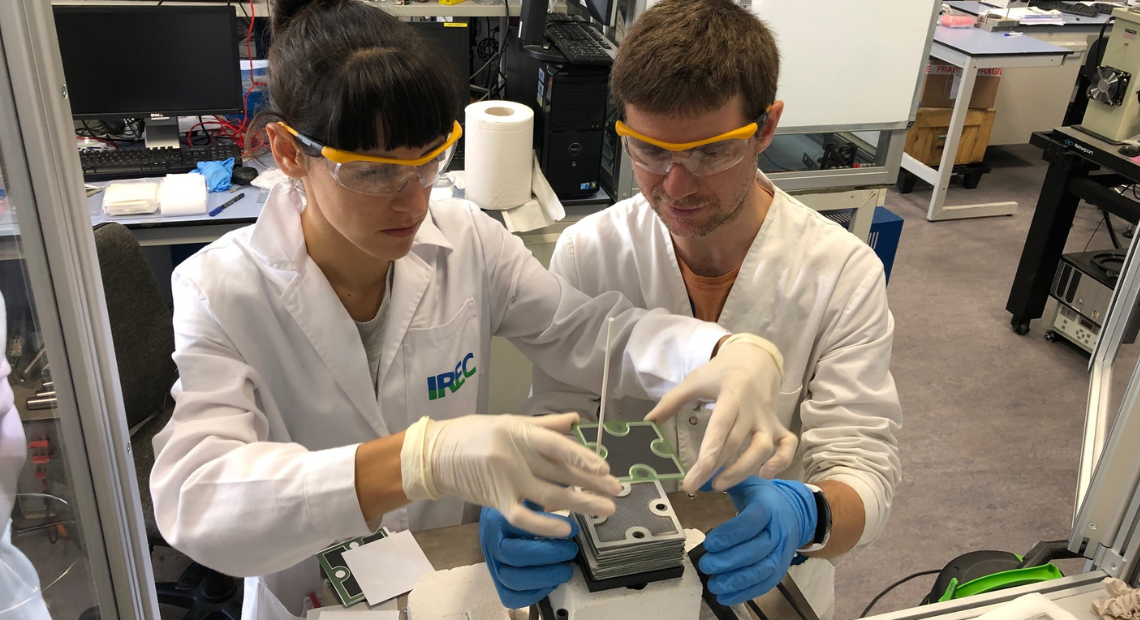24_7 ZEN, a 36-month-long project officially began on February 2023, and received a total grant of approximately €5.5 million euros from the European Commission within Horizon Europe under the Clean Hydrogen Partnership (CORDIS). 24_7 ZEN takes on the challenge of a 24/7 energy supply with a demo covering the entire value chain, from the materials engineering for optimised cells and stack, to the reversible Solid Oxide Cell (r-SOC) system and the ways to control it upon integration into real-world electricity and gas grids. Our vision is a plant with 33 kW of power source and 100 kW of power sink that can be scaled and replicated to multi-MW scale installations. 24_7 ZEN will identify optimal integration of rSOC for different scenarios and address scenarios to deploy it as a techno-economically viable renewable energy storage system.
The project is coordinated by the Catalonia Institute for Energy Research (IREC) and gathers 14 partners from Greece, Switzerland, Spain, Italy and Belgium. They bring a complementary mix of industrial partners, research organizations and academy, who will put together their leading experiences in their fields to enable the development and validation of the novel technology.
The kick – off meeting takes place in Barcelona on the 13th of February 2023 and the consortium will come together for the first time to discuss the work ahead.
Background and need
The European Commission has already positioned green H2 as key energy vector to bridge a gap in the renewable energy scenario by storing surplus electricity and enabling its reconversion back on demand. The EU Hydrogen Strategy lays out ambitious plans to build an EU hydrogen landscape with at least 40GW of renewable electrolysers, producing 10M tonnes of H2 by 2030 with large scale H2 storage facilities as a centerpiece. In order to maximize public investment in the H2 value chain, the most efficient technologies need to be developed and consolidated and possible routes for their exploitation and roll-out should be analysed and proposed. Power to Gas (PtG) and Gas to Power (GtP) solutions that can connect the existing markets for electricity and renewable gas with H2 as the energy vector, are the most promising when it comes to flexibility, adaptability, capability and efficiency. The efficiency of PtG and GtP solutions is principally determined by the electrolysis step which accounts for half of the Levelized Cost of Energy. Most existing hydrogen fuel cell projects use either Alkaline Electrolysers or Polymer Electrolyte Membrane Electrolysers that present lower efficiency and carry out the PtG and GtP operations in different external components.
In this context, reversible Solid Oxide Cells technology is presented as one of the most promising solutions in the development of flexible power-to-gas processes for energy conversion and storage. It is suitable for both daily and seasonal storage and can efficiently and smartly couple the two major energy infrastructures of our modern society, i.e. gas and electricity networks, while covering the necessities of the transport, domestic and industrial sectors. rSOC based systems which combine electrolyser and fuel cell functions into a single unit, are especially promising as they are more flexible and efficient than other competing energy storage and conversion technologies. However, before they can take their position within the H2 grid, solid oxide cells and stacks need to be enhanced, system operation needs to be optimised and cost-competitiveness improved, while designs scaled and scenarios for their connection to the grid identified and its techno-viability proven.
24/7_ZEN consortium – Pioneers in reversible SOC systems
The multidisciplinary consortium behind this project has been spearheading innovations in the energy management and are pioneers in the rSOC systems development. The project is led by Marc Torrell, senior researcher at IREC. Together, the consortium covers every step of the value chain from enhanced materials on the cell level (Politecnico di Torino, Foundation for Research and Technology Hellas, IREC), fully operational rSOC system (SolydEra SA, SolydEra SPA, Ostschweizer Fachhochschule) fully integrated, plug and play ecosystem for grid interconnection (Inerco Corporación Empresarial S.L., Bosal Emission Control Systems NV, Centre for Research & Technology Hellas), renewable energy generation (Eunice Laboratories), transmission system operator (Hellenic Gas System Operator) and international quality assurance (KIWA Cermet Italia Spa, KIWA Creiven S.R.L.). The ecosystems’ ability to optimize efficient routes of Power to Gas to Power, using H₂ or Natural Gas as fuel and inject H₂ into the grid. Furthermore, transition in <30 minutes and round-trip efficiency of 45% will be demonstrated while ensuring compliance with standards and safety regulations. Finally, the consortium count on well-connected organizations in the European hydrogen, electricity and grid services sector (Fachhochschule Zentralschweiz – Hochschule Luzern, Cluster of Bioeconomy and Environmental of Western Macedonia) that ensures the dissemination of the developed new business models and practices for renewable energy storage, including new concepts for the delivery of green hydrogen.
This consortium will develop and validate an ecosystem that can be efficiently scaled and replicated to multi-MW scale installations. At the end of the project, new and viable scenarios to provide grid balancing and supply green hydrogen will be presented by means of a deep techno-economic analysis.

By advancing reversible Solid Oxide Cell towards commercial exploitation, the renewable hydrogen deployment required for a climate neutral Europe will be one step closer.
Funded by the European Union. Views and opinions expressed are however those of the author(s) only and do not necessarily reflect those of the European Union or Clean Hydrogen Joint Undertaking. Neither the European Union nor the granting authority can be held responsible for them.




